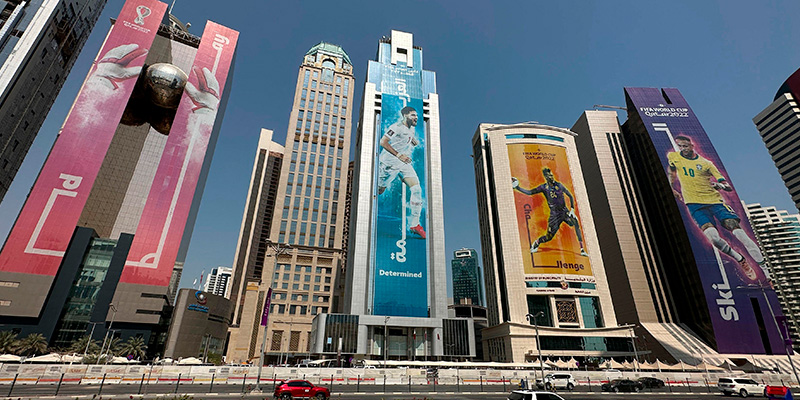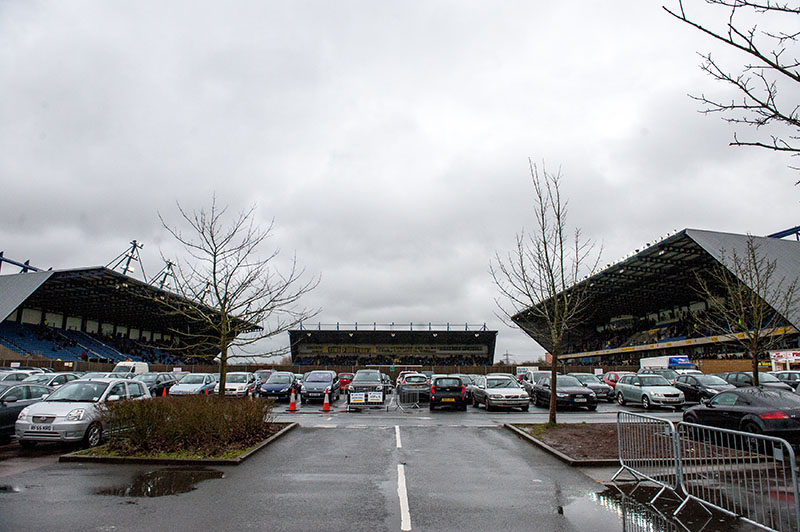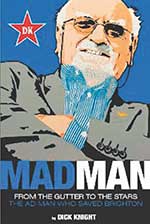
World Cup 2022 branding and images of players are seen on buildings in Doha, Qatar. Alamy
Qatar’s flawed bid should have been thrown out but officials shunned human rights concerns in favour of riches that will never reach those who need them most

World Cup 2022 branding and images of players are seen on buildings in Doha, Qatar. Alamy
Qatar’s flawed bid should have been thrown out but officials shunned human rights concerns in favour of riches that will never reach those who need them most

 From the gutter to the stars – the ad man who saved Brighton
From the gutter to the stars – the ad man who saved Brighton
by Dick Knight
Vision Sports, £20
Reviewed by Drew Whitworth
From WSC 325 March 2014
Dick Knight, chairman of Brighton and Hove Albion from 1997 to 2009, would never claim to have single-handedly saved the club. Yet in this autobiography he acknowledges that he was the “leader of an army” that rescued the Seagulls, an alliance of club and fans that not only won the right to build a new stadium, but saw the team win two divisional titles and a play-off final under Knight’s tenure. The very existence and relative success of Albion in 2013 has earned him the right to tell his side of the story.
Knight can add little to the two fine books (Build A Bonfire and We Want Falmer) already written about the fight to oust former chairman Bill Archer and build a new stadium, though he does confirm the essential roles played by John Prescott, Brighton & Hove council and the Football Association’s David Davies; the villains of the piece (including Archer, chief executive David Bellotti and Lewes District Council) are also familiar characters to those who know the history.
However, there is plenty of new insight within the book. Knight is a football fan but also a businessman or, more accurately, a man who knows business, having made his name in marketing (the “Hello Boys” Wonderbra ad being his most famous creation). These skills were constantly used to good effect during his time in charge of Brighton, including masterstrokes such as the nine-year Skint Records shirt sponsorship and Knight’s direct input into fan-led campaigns.
He also offers a relatively rare insider view of club chairmanship, often amusingly. He openly tells other chairmen that the Albion player they are about to buy is injury-prone or has disciplinary problems, but the sales proceed anyway. He discusses how American Express, the current stadium and shirt sponsors, were sold the deal on its community and corporate social responsibility values, rather than as a way of increasing brand awareness – which as Knight points out, they do not need.
This commitment to the Brighton & Hove community was central to Knight’s success as chairman, and it is clear in the book how he is as proud of the club’s award-winning Albion in the Community programme as anything won the pitch. Towards the end of the book, excellently ghost-written by the Times’ Nick Szczepanik and David Knight, there is a guarded but obvious critique of the new regime regarding how they view this part of the club’s operations.
There is frustration in parts of Mad Man, particularly regarding how his time as Brighton’s chairman ended, but generally Knight writes with the justified self-satisfaction of someone who took on a job at the worst possible moment and nevertheless saw his goals achieved. Via a form at the back of the book, Knight also offers Albion fans a chance to buy some of his remaining shares in the club to ensure they will always have a voice on the board. His “man of the people” credentials are firm and this book shows why he will never go short of a drink in Sussex.
 The fortunes of Sheffield Wednesday and the club’s former chairman, Dave Richards, have differed wildly in the past 20 years, writes Tom Hocking
The fortunes of Sheffield Wednesday and the club’s former chairman, Dave Richards, have differed wildly in the past 20 years, writes Tom HockingWhen Bert McGee, who had been the Sheffield Wednesday chairman since the mid-1970s, stepped down in 1990, it was left to a local businessman and fan of the club, Dave Richards, to continue his predecessor’s good work. Over the following two decades, Richards’s rise in football was as meteoric as Wednesday’s fall. The contrast has been so remarkable it prompted the Guardian’s David Conn to call Wednesday “the picture of Dorian Gray in Sir Dave Richards’s attic”.